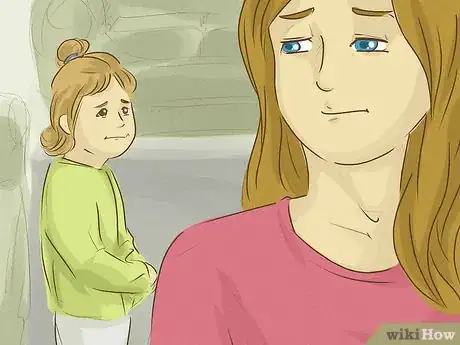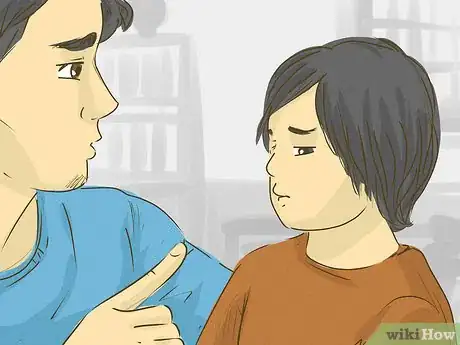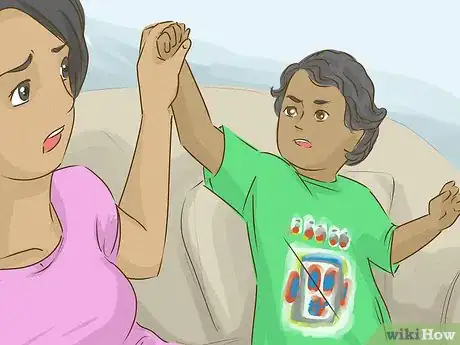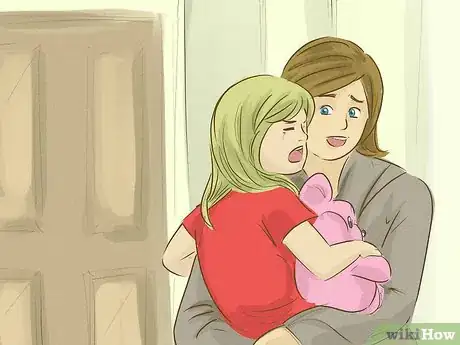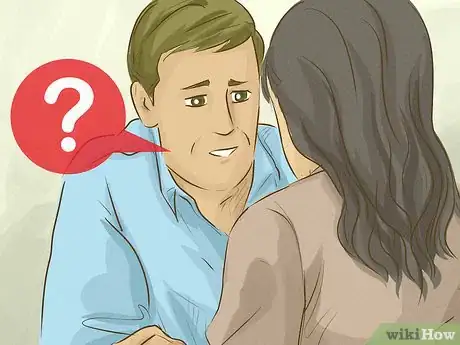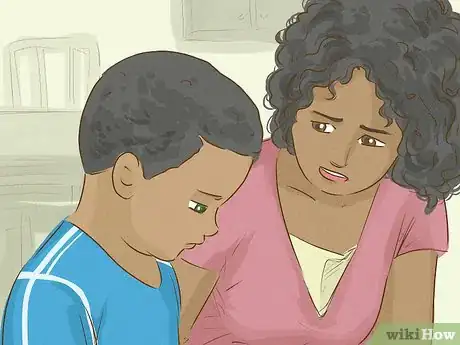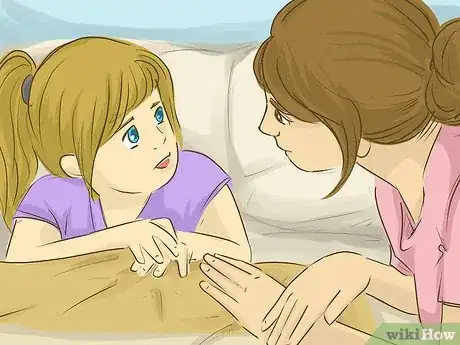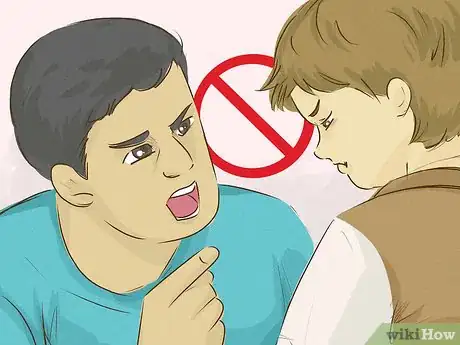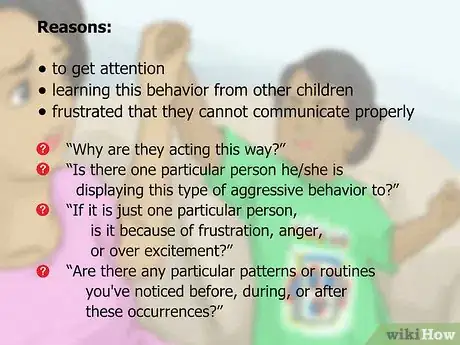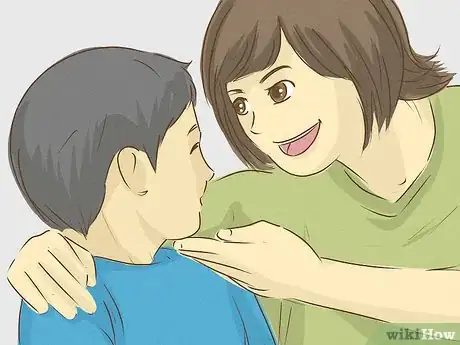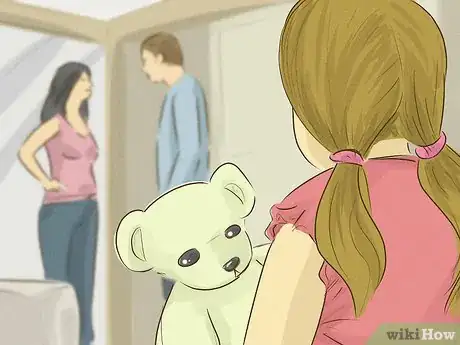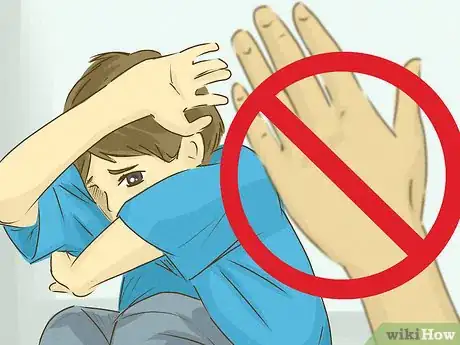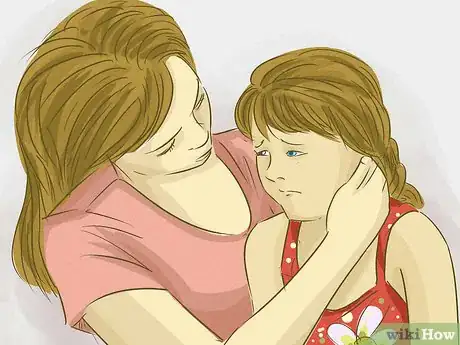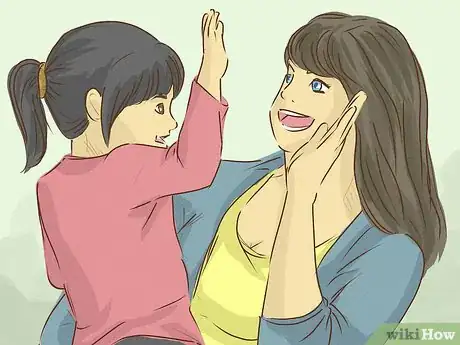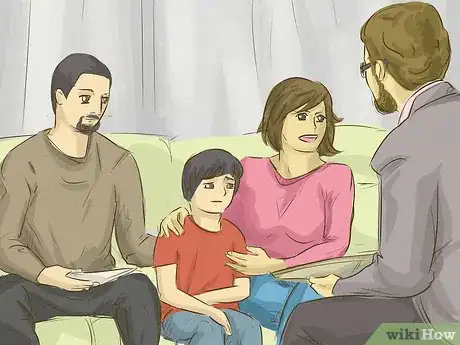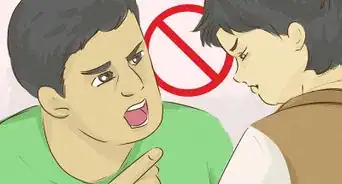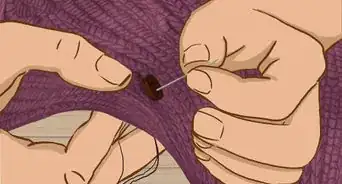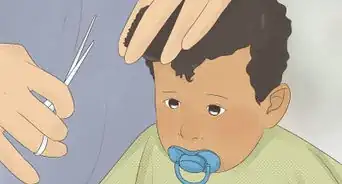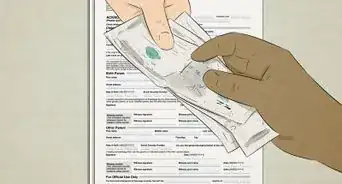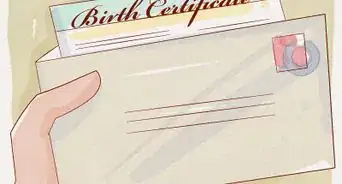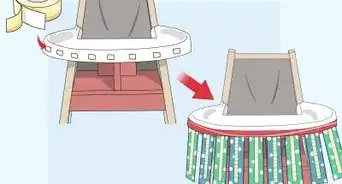This article was co-authored by Wits End Parenting. Wits End Parenting is a parent-coaching practice based in Berkeley, California specializing in strong-willed, “spirited” children with impulsivity, emotional volatility, difficulty “listening,” defiance, and aggression. Wits End Parenting's counselors incorporate positive discipline that is tailored to each child’s temperament while also providing long-term results, freeing parents from the need to continually re-invent their discipline strategies.
There are 12 references cited in this article, which can be found at the bottom of the page.
This article has been viewed 10,264 times.
Young children can become frustrated easily, and they may react by hitting you. This can be alarming to new parents, but it is quite common. The best way to respond is calmly but firmly. Prevent them from hitting you again, and talk to them about why hitting is wrong. If your child has hit you several times, you may want to evaluate the situation to see what can be done to prevent further episodes.
Steps
Stopping Their Tantrum
-
1Remain calm. You might be feeling a range of emotions when a child hits you, such as anger or sadness. It is important that you remain calm at all times. An explosive reaction may only teach the child that anger is the proper way to respond when someone upsets you.[1]
- It is also important to remove the child from the situation or to remove yourself from the situation. If you find it difficult to calm down, excuse yourself for a minute. Tell the child calmly but firmly, “That made me very sad, and now I need a minute to myself.” Go into a bathroom or separate room to calm down.[2]
- Try breathing deeply while counting to ten or squeezing a stress ball to help you calm down.
- Avoid giving the child too much attention.
-
2Tell them to stop. Be firm but gentle when you tell to stop. They need to know what they did was wrong, but you should not yell or scream at them. Even if the child is a toddler, you should tell them to stop.
- You can say, “Do not hit me again! It hurts me.”
- You might also say, “It is not right to ever hit someone, no matter how mad you are.”
-
3Block the child’s hand. If the child tries hitting you again, block their hand with your own. If you must, gently take their hand in yours to prevent them from hitting you again. You may also want to try walking a few feet away from the child so that they cannot reach you. This helps make the point that what they did was wrong.[3]
- Be gentle as you do this. Hold their hand but do not wrench it away or squeeze it.
-
4
Talking to the Child
-
1Ask them why they hit you. It is important to ask the child why they hit you right after it happens. Let the child explain their emotional state. Ask them why they hit you, and try to get them to explain their feelings at that moment. Give them a chance to talk.[6]
- You can ask, “Why did you hit me?” or “Why did you just do that?”
- If your child is too young to verbalize these feelings, you might try to answer for them. Look into their eyes and say, "You're angry right now, aren't you?" This will teach them how to label their feelings.[7]
- You can have this talk immediately after they hit or after they have calmed down.
- Be aware that your child may be acting aggressively for a variety of reasons certain environmental (internal or external) stressors the child is under (could be anything), not having a routine, over stimulation, physical and/or mental exhaustion, not enough parental supervision or attention, and/or reflecting the behaviors of others (could have seen other children, family, friends, etc. hitting).
-
2Acknowledge their feelings. Tell your child that you understand how they feel but that there is no reason to ever hit another person. By starting out with sympathy, you acknowledge and validate your child’s emotional state.[8]
- You might say, “I know you’re angry because we didn’t make it to the park today, but it is never ok to hit someone.”
- A simple way to say this to very young children is "I know you're sad, but hitting is wrong."
-
3Explain why hitting is wrong. Your child may not realize that what they are doing is wrong. They may be too mad or upset to understand their actions. Always remind them that hitting is painful and that it makes other people feel sad or upset.[9]
- You can say, “Hitting hurts people.”
- You might also say, “When you hit people, it hurts, and they start to feel bad.”
- A simple way to tell young toddlers is to say, "Ouch! Hitting hurts." As you say this, you might want to cringe or scrunch your face up. This will show your child that hitting hurts other people.
-
4Avoid yelling. A calm voice is always best. Even if your child is crying or screaming, you can help them relax by using a softer voice. This will calm them down while teaching them that yelling is not acceptable.
Teaching Emotional Intelligence
-
1Identify their trigger.[10] If the child has hit you several times, try to identify what might be causing this behavior. Do they always hit at a particular time or during a particular event? Has something recently changed in the family that might be making the child upset?
- If the child is hitting you to get attention, try ignoring the action. This might teach them that hitting you will not get the attention that they want.
- If you suspect that your child is learning this behavior from other children, you should try to remove them from that peer group. Find a different daycare or play group so that they are not influenced by this bad behavior.[11]
- Some children may hit because they are frustrated that they cannot communicate properly. Try to teach your child certain phrases or actions to allow them to demonstrate what they want.[12]
- Try asking yourself some questions to see if you can identify a trigger. For example, you can as yourself questions like “Why are they acting this way?” “Is there one particular person he/she is displaying this type of aggressive behavior to?” “If it is just one particular person, is it because of frustration, anger, or over excitement?” and “Are there any particular patterns or routines you've noticed before, during, or after these occurrences?”
-
2Praise good behavior. When your child calms down after a tantrum, acknowledge their good behavior. Make it a habit to compliment your child when they have acted correctly.[13]
- For example, if your child has a problem and tells you about it, you can say, “Good job using your words.”
- If your child apologizes to you for hitting you, you can say, “Thank you for saying you’re sorry. I understand how you feel, and I love you very much.”
-
3Model appropriate behavior for your child.[14] Children learn by example. If they see you hitting or screaming at other people, they will learn that these actions are acceptable behavior in public. Act towards other people the way you want your child to act towards you.[15]
- Use a calm, even voice when disagreeing with people. This will show your child how to act during a disagreement.
- If you did something wrong, apologize. Say, “I’m sorry for that. I know what I did was wrong.”
-
4Avoid physical punishment. Hitting or spanking your child will only teach them that physical violence is an appropriate way to act. It will not discourage them from hitting, and it may even influence them to become more physical as they grow older.[16]
-
5Be aware of your child’s limitations. Certain circumstances may cause your child to act aggressively, so you may need to avoid these situations. For example, if your child only acts aggressively at play groups, then it might be best to avoid taking your child to play groups. Or, if you child becomes aggressive when they watch certain tv shows or play certain video games, then it might be best to prevent your child from engaging in those activities.
- Try to engage your child in low-key activities to help calm them. For example, you could sit and listen to some calming music with your child or encourage them to color.
-
6Appreciate your child’s efforts. It may take time for your child to develop the ability to control their emotions, so it is important to acknowledge their efforts. For example, if you notice your child making an effort to control their anger, then praise them for their efforts.
- Try saying something like, “I am proud of you for…”
- Keep in mind that young children have a hard time controlling their emotions, so it is important to acknowledge their efforts and encourage them.
-
7Take the child to see a behavioral specialist. If the child keeps hitting or starts escalating their behavior—through biting, kicking, or throwing things you may want to consult your pediatrician. They may be able to recommend a child behavioral specialist who can identify the underlying problem and help you fix it. Some things to watch out for include:
- Following ongoing patterns of defiant, disobedient, or hostile behavior towards any authority figures.
- Frequently or easily losing their temper.
- Being deliberate with their actions or engaging in activities that annoy others.
- Constantly expressing annoyance, or being chronically sensitive.
- Having ongoing anger and resentment that they cannot control alone or with the help of a parent.
- Constantly acting spiteful and vindictive, and is always argumentative.
Expert Q&A
-
QuestionWhat should I do if my toddler hits me?
 Wits End ParentingWits End Parenting is a parent-coaching practice based in Berkeley, California specializing in strong-willed, “spirited” children with impulsivity, emotional volatility, difficulty “listening,” defiance, and aggression. Wits End Parenting's counselors incorporate positive discipline that is tailored to each child’s temperament while also providing long-term results, freeing parents from the need to continually re-invent their discipline strategies.
Wits End ParentingWits End Parenting is a parent-coaching practice based in Berkeley, California specializing in strong-willed, “spirited” children with impulsivity, emotional volatility, difficulty “listening,” defiance, and aggression. Wits End Parenting's counselors incorporate positive discipline that is tailored to each child’s temperament while also providing long-term results, freeing parents from the need to continually re-invent their discipline strategies.
Parenting Specialists Try to identify what triggered them to hit you so you can avoid and address their behavior.
Try to identify what triggered them to hit you so you can avoid and address their behavior.
Warnings
- It is never appropriate to respond by hitting the child back. This will only encourage the child to hit you more, and it can harm the child.⧼thumbs_response⧽
- If the situation is severe or if you feel that yourself or others are in immediate danger, then call emergency services, such as by dialing 911 in the US.⧼thumbs_response⧽
References
- ↑ http://www.handinhandparenting.org/article/when-your-toddler-hits-you/
- ↑ https://www.psychologytoday.com/blog/peaceful-parents-happy-kids/201306/what-should-you-do-when-your-child-hits-you
- ↑ http://www.handinhandparenting.org/article/when-your-toddler-hits-you/
- ↑ Wits End Parenting. Parenting Specialists. Expert Interview. 5 March 2020.
- ↑ http://www.quickanddirtytips.com/parenting/family-time/what-to-do-if-your-kids-hit
- ↑ http://www.quickanddirtytips.com/parenting/family-time/what-to-do-if-your-kids-hit
- ↑ http://www.parents.com/toddlers-preschoolers/development/language/talking-to-toddlers/
- ↑ http://www.handinhandparenting.org/article/when-your-toddler-hits-you/
- ↑ https://www.psychologytoday.com/blog/peaceful-parents-happy-kids/201306/what-should-you-do-when-your-child-hits-you
- ↑ Wits End Parenting. Parenting Specialists. Expert Interview. 5 March 2020.
- ↑ http://www.parenting.com/article/ask-dr-sears-toddler-hitting
- ↑ http://www.mommyshorts.com/2012/04/a-5-step-approach-to-stop-your-child-from-hitting.html
- ↑ http://www.mommyshorts.com/2012/04/a-5-step-approach-to-stop-your-child-from-hitting.html
- ↑ Wits End Parenting. Parenting Specialists. Expert Interview. 5 March 2020.
- ↑ http://www.mommyshorts.com/2012/04/a-5-step-approach-to-stop-your-child-from-hitting.html
- ↑ http://www.babycenter.com/404_how-can-i-get-my-child-to-stop-hitting-me_13938.bc
